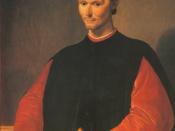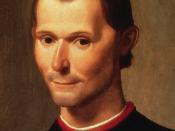Explain the relationship between 'virtú' and Fortune in Machiavelli's thought.
The following essay is written to highlight the relationship between Machiavelli's delineations of the concepts of virtú and fortune in his 1532 political treatise, 'The Prince'. In order to examine the relationship between these two notions, their relation to the rest of the text and their relation to the context in which Machiavelli defined them, it is first necessary to explore and understand Machiavelli's biography, the political situation in Italy at the time of Machiavelli's writing and common religious views of morality.
Born in May 1469, Niccolò Machiavelli was raised in Florence at a time political tumult and instability in Italy, which was fragmented in to five/six city states which acted as separate political entities. These separate entities, however, did not battle alone for regional influence and control but were instead joined by power-hungry political forces from France, Switzerland, the Holy Roman Empire and Spain.
Machiavelli received an excellent humanist education, studying grammar, rhetoric and Latin at the University of Florence and made his entrance into public view after his appointment as a civil servant of the Florentine Republic, as the Second Chancery of the Republic of Florence in 1498 at the age of 29. Between 1498 and 1512 Machiavelli undertook five visits to different political courts in Europe on behalf of the Florentine Republic, each visit feeding in to his thoughts and ideas developed in 'The Prince'. In 1500, Machiavelli journeyed to France to view the court of Louis XII, which fed into his commentary on Louis XII's loss of Naples in chapter three of 'The Prince'; 'Now consider with what little trouble the king could have maintained his standing in Italy, if he had observed the rulesâ¦Louis had, therefore, made these five mistakes: he had destroyed the...


